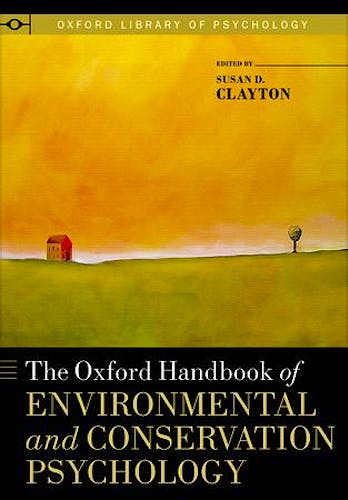

No hay productos en el carrito



The Oxford Handbook of Environmental and Conservation Psychology (Oxford Library of Psychology)
Clayton, S.
1ª Edición Octubre 2012
Inglés
Tapa dura
720 pags
2100 gr
null x null x null cm
ISBN 9780199733026
Editorial OXFORD UNIVERSITY PRESS
LIBRO IMPRESO
-5%
247,14 €234,78 €IVA incluido
237,63 €225,75 €IVA no incluido
Recíbelo en un plazo de
2 - 3 semanas
Description
Environmental psychology, which studies the ways in which people perceive and
respond to the physical environment, is an established area of study. Conservation
psychology has a much more recent history, prompted by the desire to focus psychological
research on the need to protect the natural environment. What is conservation
psychology, and what is its relationship to environmental psychology?
The Oxford Handbook of Environmental and Conservation Psychology includes basic
research on environmental perceptions, attitudes, and values; research on specific
environments, such as therapeutic settings, schools, and prisons; environmental
impacts on human well-being; and ways to promote a more sustainable relationship
between people and the natural environment. By presenting an extensive review
of current research, the handbook serves as a thorough guide to the state of
knowledge about a wide range of topics at the intersection of psychology and
the physical environment. Beyond this, it provides a better understanding of
the relationship between environmental and conservation psychology, and some
sense of the directions in which these interdependent areas of study are heading.
Research on the human-environment relationship is increasingly relevant to understanding
and addressing the environmental challenges society is facing. This handbook
should serve as a resource for professionals both within and outside of psychology
who are trying to comprehend the human implications of environments, and to
design programs, policies, and environments that are cognizant of human psychology.
Table of Contents
1. Introduction: Environmental and Conservation Psychology
Susan D. Clayton and Carol D. Saunders
Part One: Thinking about Environments
2. Foundations of an Ecological Approach to Psychology
Harry Heft
3. Environmental Perception: Wayfinding and Spatial Cognition
Ann Sloan Devlin
4. Environmental Attitudes
Robert Gifford and Reuven Sussman
5. Environmental Values
Linda Steg and Judith I.M. de Groot
6. Justice and the Allocation of Natural Resources: Current Concepts and Future
Directions
Geoffrey J. Syme and Blair E. Nancarrow
7. Children and Nature
Olin Eugene Myers, Jr.
8. Emotions and Environment
Elisabeth Kals and Markus M. Müller
9. Place Attachment
Kalevi M. Korpela
10. Environment and Identity
Susan D. Clayton
11. Cultural Differences in Environmental Engagement
Taciano L. Milfont
Part Two: Specific Environments
12. Cities
Gabriel Moser
13. Residential Places and Neighborhoods: Towards Healthy Life, Social Integration,
and Reputable Residence
Marino Bonaiuto and Susana Alves
14. Work Environments
Jennifer A. Veitch
15. School Environments
Henry Sanoff and Rotraut Walden
16. Healthcare Environments
Ferdinando Fornara and Cláudia Campos Andrade
17. Correctional Environments
Richard E. Wener
18. Natural Landscapes
Massimiliano Scopelliti, Giuseppe Carrus, and Mirilia Bonnes
19. Extreme and Unusual Environments: Challenges and Responses
Peter Suedfeld
Part Three: Environments and Human Well-being
20. Noise
Stephen A. Stansfeld, Charlotte Clark, and Rosanna Crombie
21. Response to Environmental Disasters
Michael K. Lindell
22. Therapeutic Uses of Nature
Keith C. Russell
23. Restorative Environments
Henk Staats
24. Healthy Physical Activity and Eating: Environmental Supports for Health
Barbara B. Brown and Carol M. Werner
25. Environmental Epiphanies: Theoretical Foundations and Practical Applications
Joanne Vining and Melinda J. Merrick
26. The Natural Environment in Residential Settings: Influences on Human Health
and Function
Nancy M. Wells and Kimberly A. Rollings
27. The Development of Conservation Behaviors in Childhood and Youth
Louise Chawla and Victoria Derr
28. Promoting Proenvironmental Behavior
P. Wesley Schultz and Florian G. Kaiser
Part Four: A Sustainable Relationship Between Humans and Nature
29. Protecting Natural Resources: Psychological and Contextual Determinants
of Freshwater Conservation
Víctor Corral-Verdugo, Martha Frías-Armenta, César O. Tapia-Fonllem,
and Blanca S. Fraijo-Sing
30. Collaborative Processes in Ecosystem Management
Charles D. Samuelson and Clare L. Barratt
31. Learning Our Way Out of Un-sustainability: The Role of Environmental Education
Arjen E.J. Wals
32. Psychology and Climate Change: Beliefs, Impacts, and Human Contributions
Janet K. Swim, Ezra M. Markowitz, and Brittany Bloodhart
Part Five: Conclusion
33. Conclusions: Directions for the Future
Susan D. Clayton
© 2026 Axón Librería S.L.
2.149.0